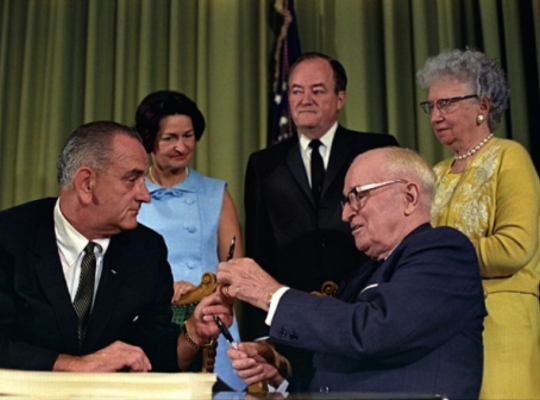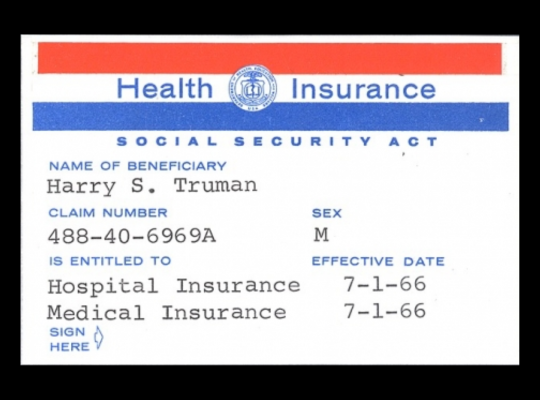
Happy 60th Birthday, Medicare
By Steve Foelsch, Disability Policy Advisor
Sixty years ago, on July 30, 1965, President Lyndon B. Johnson signed Medicare into law, launching one of the most transformative programs in American history.
Born from the ashes of President Harry Truman's unsuccessful attempt to implement a national healthcare system in the late 1940s, Medicare has become a vital pillar of support for millions of Americans. Despite decades of political battles and persistent predictions of its demise, Medicare endures—and thrives—as the most popular and efficient government program in the United States.
Before Medicare's establishment, almost half of Americans over the age of 65 had no health insurance. Medical costs drove countless seniors into poverty, and access to care was often a luxury, not a right. In the face of fierce opposition—politicians cried "communism," and the American Medical Association branded it "socialized medicine"—it took 14 years of congressional struggle to finally enact a compromise.
Advocates, shifting their focus from a universal health plan to one that served the elderly population receiving Social Security, created Medicare as a targeted first step.
That first step was modest: just 60 days of hospital insurance for seniors. But it was also visionary.
The hope was that once Americans saw how successful and humane a public healthcare system could be, coverage would expand—to infants, children, and eventually, everyone. And while that vision has not yet fully come to pass, Medicare has saved—and continues to save—countless lives.
In 1972, the program was expanded to include people of all ages with end-stage renal disease. Yet today, in 2025, Medicare still does not cover children or all disabled individuals, and in many ways, its core structure remains frozen in 1965.

After signing the Medicare bill into law, President Johnson hands President Truman the pen he used.
Today, almost 70 million Americans rely on Medicare. It operates with a remarkably low administrative overhead—just 2%—and it continues to serve as a lifeline for people like me.
As someone with a significant disability who is able to live independently and work, I often hear praise for my determination in a world not built for me. And while I deeply appreciate those kind words, I always respond by saying:
"I didn't do it all by myself. I have health insurance."
Without Medicare, I would not be here. It is not an exaggeration to say that this program saved my life.
But as we mark this important 60th anniversary, we must also reflect on the challenges Medicare now faces. One of the most pressing is the rapid growth of Medicare Advantage plans—private insurance options subsidized by the government. These are not the same as traditional Medicare. Yet more than 50% of Medicare participants are now enrolled in some form of Medicare Advantage. Disturbingly, pending legislation could make these private plans the default enrollment for new Social Security beneficiaries.
This shift is not what the original architects of Medicare intended. They believed Medicare would evolve into a national plan that covered all Americans. They would be shocked—and likely disheartened—to see that over half of eligible individuals are now on private insurance, potentially undermining the public program they fought so hard to create.
We must be vigilant. Medicare Advantage may seem convenient, but it operates under different rules and profit-driven incentives that do not always align with patients' best interests. Traditional Medicare has its flaws—including a 20% deductible that forces many to seek Medigap or Medicare Plus plans—but its spirit remains rooted in equity, accessibility, and public service.

So today, let us honor Medicare for what it has accomplished—and recommit ourselves to protecting and improving it. Let's make sure it continues to serve not just the elderly, but all Americans who need care. Let's ensure that future generations can celebrate Medicare's 70th, 80th, and 100th anniversaries with pride.
Happy 60th Anniversary, Medicare. May we all continue to benefit from your legacy—and may we all fight for a future where every American has the same opportunities and resources that I have.
More resources and information:
The History of Medicare and Medicaid (KFF video – Note: This video is primarily text without audio description.)
The History of Medicare (AARP article)
Medicare and Medicaid 101 (NICA – National Infusion Center video)
The Reason America Healthcare is so Expensive (Vox video)

The first Medicare card ever issued. The beneficiary is Harry S. Truman.


